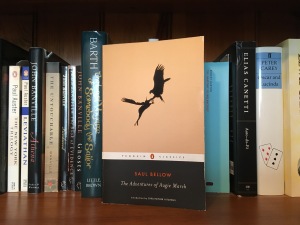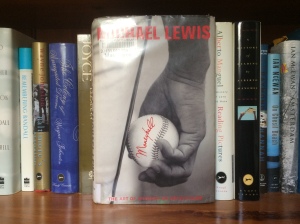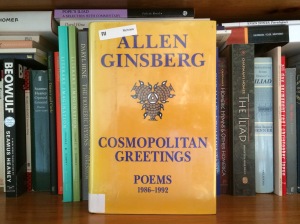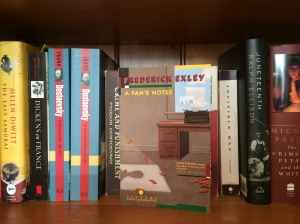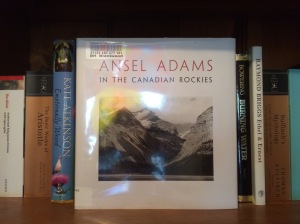The Post-Apocalyptic Primitives of Labrador
John Wyndham, The Chrysalids (1955)
I don’t know how necessary a plot summary is for this book — do most people recall it from high school? In brief, the survivors of something know as “Tribulation” (nuclear holocaust, presumably) live on in small communities, where they are guided by religion and watch vigilantly for any mutation of plant, animal or human life.
The main character, David, befriends a girl named Sophie, who cannot go to school or play with other children because she was born with six toes, and if she is discovered she will be banished to “the Fringes”. In this conversation, David is trying to fill her in on some of what he is learning in school:
The world, I was able to tell her, was generally thought to be a pretty big place, and probably round. The civilized part of it — of which Waknuk was only a small district — was called Labrador. This was thought to be the Old People’s name for it, though that was not very certain. Round most of Labrador there was a great deal of water called the sea, which was important on account of fish. Nobody that I knew, except Uncle Axel, had actually seen this sea because it was a long way off, but if you were to go three hundred miles or so east, north, or north-west you would come to it sooner or later. But south-west or west, you wouldn’t; you’d get to the Fringes and then the Badlands, which would kill you.
It was said, too, though nobody was sure, that in the time of the Old People Labrador had been a cold land, so cold that no one could live there for long, so they had used it then only for growing trees and doing their mysterious mining in. But that had been a long, long time ago. A thousand years? — two thousand years? — even more, perhaps? People guessed, but nobody really knew. There was no telling how many generations of people had passed their lives like savages between the coming of Tribulation and the start of recorded history. Only Nicholson’s “Repentances” had come out of the wilderness of barbarism, and that only because it had lain for, perhaps, several centuries sealed in a stone coffer before it was discovered. And only the Bible had survived from the time of the Old People themselves. (33)
There are other references to Labrador, and also to “the big island of Newf,” but the passage above contains the essentials. It’s a remarkable collection of common ideas about Canada, all captured in a couple of paragraphs. First there is the idea that Canada is cold — so cold that no one could live there for long, which is odd given that people have been living in Labrador for a while. The “Old People” using Labrador for growing trees and mining constitutes another iteration of the common idea of Canada as a country that is useful mainly for providing natural resources, and the importance of fish connects with this as well. And then there is that word “wilderness,” which seems here to be used metaphorically in connection with barbarism, but is nevertheless suggestive of Canada as a country lacking in civilization.
This last idea is further developed through a conversation between David and his Uncle Axel:
… Where are they and their wonderful world now?’
‘”God sent Tribulation upon them,”‘ I quoted.
‘Sure, sure. You certainly have taken in the preacher-words, haven’t you? It’s easy enough to say — but not so easy to understand, specially when you’ve seen a bit of the world, and what it has meant. Tribulation wasn’t just tempests, hurricanes, floods and fires like the things they had in the Bible. It was like all of them together — and something a lot worse, too. It made the Black Coasts, and the ruins that glow there at night, and the Badlands. Maybe there’s a precedent for that in Sodom and Gomorrah, only this’d be kind of bigger — but what I don’t understand is the queer things it did to what was left.’
‘Except in Labrador,’ I suggested.
‘Not except in Labrador — but less in Labrador and Newf than any other place,’ he corrected me. ‘What can it have been — this terrible thing that must have happened. And why? I can almost understand that God, made angry, might destroy all living things, or the world itself; but I don’t understand this instability, this mess of deviations — it makes no sense.’ (70)
This fills out the picture of the post-Apocalyptic world a bit: the Black Coasts are the major U.S. cities, which have been reduced to burned rubble, and the glowing at night indicates the after-effects of nuclear war, as do the “deviations,” which are the genetic mutations that lead to people with six toes and so on, like Sophie. What is interesting for our purposes here, though, is that Newfoundland and Labrador suffered less than the other regions. The idea appears to be that these areas, isolated and remote from large population centres, would not have been targets for direct nuclear strikes, but would only be affected by the fallout from strikes on the major U.S. cities to the south. So again we have the idea of Canada generally, and Newfoundland and Labrador in particular, as being essentially remote wilderness places without enough people or industry to make them worth targeting in nuclear war.
Who Are These People Anyway?
The first passage quoted above also raises the tricky question of time. Apparently no one is certain how much time has passed since the Tribulation, but it is spoken of here as at least a thousand years, and in terms of many generations. Given that the ancestors of the characters in the novel have been living in Labrador for that long, it’s reasonable for us to ask: are the people in this book Canadians?
Since Labrador was considered uninhabitable in the time of the Old People, we are perhaps meant to assume that the original ancestors of the people now in Waknuk fled there from somewhere further south (the U.S.?) during the Tribulation, and that Labrador was remote enough that it was spared the destruction that reduced the more heavily inhabited areas of the continent to blackened rubble. At this point, however, they have been there long enough that it seems fair to consider the characters in the novel Canadians — or at least Labradorians, given that that name has persisted even though Canada itself no longer seems to exist as an entity.
This is of note because of what happens later in the novel. I don’t want to get bogged down in a tedious plot summary, but a little bit is necessary here: David, his cousin Rosalind and his younger sister Petra and several of the other characters are empaths who can communicate with one another through their thoughts alone. Petra, however, is much more powerful than the others, and is able to communicate with a far more technologically advanced group of Tribulation survivors who seem to live in New Zealand (called “Sealand”). In the end the New Zealanders come to rescue Petra, and David and Rosalind as well, from Labrador, where their special abilities put them on the wrong side of the religious zealots who run the Waknuk government.
The following passages come from the lead-up to this rescue, when Petra is trying to communicate with the empaths from New Zealand. Here they are trying to convey where they are:
‘Good,’ said Rosalind. ‘Look out, everybody! Here we go again.’
She pictured an ‘L’. Petra relayed it with devastating force. Rosalind followed up with an ‘A’ and so on, until the word was complete. Petra told us:
‘She understands, but she doesn’t know where Labrador is. She says she’ll try to find out….’ (125)
This is rather heart-breaking, really: our heroes are struggling to be rescued by the powerful super-beings from New Zealand, but with all their advanced technology and empathic powers, they’ve never heard of Labrador. In the post-Apocalyptic world, as in the pre-Apocalyptic one, Canada is just not significant enough to have registered on the minds of anyone outside of it.
And then the final insult, just after Petra has ended a conversation with the “Sealanders”:
We let her [Petra] prattle on. It was difficult to make sense of a lot of the things she said, and possibly she had not got them right, anyway, but the one thing that did stand out clearly was that these Sealanders, whoever and wherever they were, thought no small beans of themselves. It began to seem more than likely that Rosalind had been right when she had taken ‘primitive’ to refer to ordinary Labrador people. (134)
So there we have it: in the end, our more-or-less-Canadian heroes are reduced to being called “primitive” by the New Zealand superbeings, who come riding to the rescue at the end because the empathic Labradorians, for all their extraordinary abilities, aren’t able to defeat a rag-tag bunch of mutants on their own.
Sigh.

